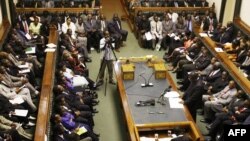HARARE, WASHINGTONDC —
Local Government permanent secretary Killian Mpingo says his ministry has completed drafting legislation that will activate provincial councils so that they can start operating early next year.
Giving oral evidence to the National Assembly’s Local Government, Public Works and National Housing Portfolio Committee, Mpingo said councils cannot continue operating outside the constitution.
The provincial councils were created through some provisions of the new Zimbabwe constitution but the law has not been changed to accommodate them.
Mpingo said the bill on the provincial councils will soon go to Cabinet for approval.
He said the law will, among other things, regulate the councils’ operations and deal with issues of staff, conditions of service and related issues.
The two metropolitan councils of Harare and Bulawayo, he said, will be chaired by mayors of the two cities while chairpersons in the other eight provincial councils will be elected from two candidates nominated by the party with the highest number of votes in the respective provinces.
Members of the National Assembly and Senate will constitute provincial councils in their provinces.
Meanwhile, Mpingo also told the committee that his ministry does not buy cars for chiefs but assists the traditional leaders in securing vehicles through loans. The money is then recovered from the chiefs’ salaries.
Zimbabwe has about 272 traditional chiefs, earning at least $300 a month. In addition there are 452 headmen earning $140 and 25,000 village heads on a $25 monthly allowance.
Mpingo further said cabinet will soon discuss the findings of an audit team set up by his ministry to investigate illegal land allocations and construction in Seke and Chitungwiza before moving in to restore order in the satellite town.
The government had planned to demolish illegal structures and buildings in towns and cities but back-tracked following heavy criticism from the public and human rights groups who felt the program would leave thousands homeless as was the case with Operation Remove Filth (Murambatsvina) in 2005.
But Chitungwiza Residents Trust chairperson Marvellous Khumalo said residents will not accept the audit report because investigators did not consult them.
"If this report has content which is not pro-people, we will not accept it. Our position as CHITREST is clear that we are against and we will always be against any form of demolition of any property in this town," said Khumalo.
Local Government deputy minister Joel Biggie Matiza, speaking last month, said the government will only proceed with planned demolitions after the release of the audit.
Studio 7 could not reach the deputy minister for comment. Chitungwiza mayor Philip Mutoti could not comment saying he has not yet read the report.
Giving oral evidence to the National Assembly’s Local Government, Public Works and National Housing Portfolio Committee, Mpingo said councils cannot continue operating outside the constitution.
The provincial councils were created through some provisions of the new Zimbabwe constitution but the law has not been changed to accommodate them.
Mpingo said the bill on the provincial councils will soon go to Cabinet for approval.
He said the law will, among other things, regulate the councils’ operations and deal with issues of staff, conditions of service and related issues.
The two metropolitan councils of Harare and Bulawayo, he said, will be chaired by mayors of the two cities while chairpersons in the other eight provincial councils will be elected from two candidates nominated by the party with the highest number of votes in the respective provinces.
Members of the National Assembly and Senate will constitute provincial councils in their provinces.
Meanwhile, Mpingo also told the committee that his ministry does not buy cars for chiefs but assists the traditional leaders in securing vehicles through loans. The money is then recovered from the chiefs’ salaries.
Zimbabwe has about 272 traditional chiefs, earning at least $300 a month. In addition there are 452 headmen earning $140 and 25,000 village heads on a $25 monthly allowance.
Mpingo further said cabinet will soon discuss the findings of an audit team set up by his ministry to investigate illegal land allocations and construction in Seke and Chitungwiza before moving in to restore order in the satellite town.
The government had planned to demolish illegal structures and buildings in towns and cities but back-tracked following heavy criticism from the public and human rights groups who felt the program would leave thousands homeless as was the case with Operation Remove Filth (Murambatsvina) in 2005.
But Chitungwiza Residents Trust chairperson Marvellous Khumalo said residents will not accept the audit report because investigators did not consult them.
"If this report has content which is not pro-people, we will not accept it. Our position as CHITREST is clear that we are against and we will always be against any form of demolition of any property in this town," said Khumalo.
Local Government deputy minister Joel Biggie Matiza, speaking last month, said the government will only proceed with planned demolitions after the release of the audit.
Studio 7 could not reach the deputy minister for comment. Chitungwiza mayor Philip Mutoti could not comment saying he has not yet read the report.





